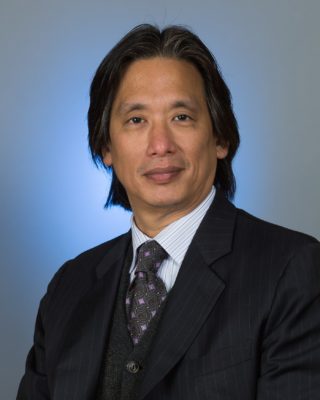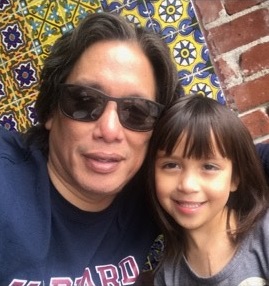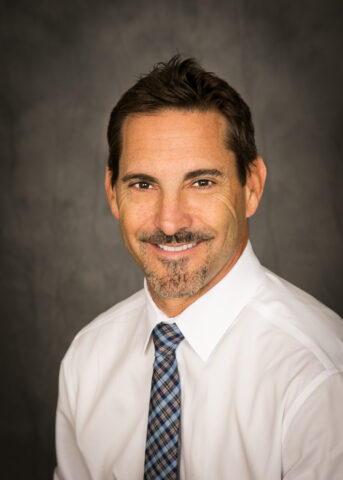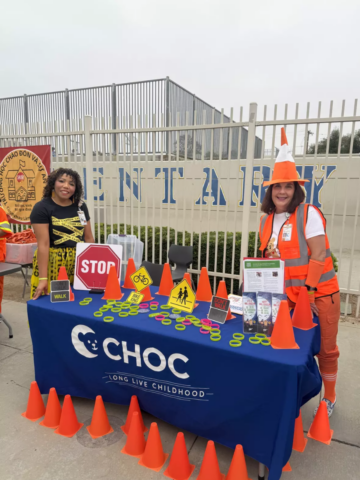Dr. Anthony Chang had been a physician for 40 years — and had cared for thousands of medically complex children with fragile hearts — when his own child needed heart surgery. Around the same time, he became a heart surgery patient himself. Experiencing healthcare from these new perspectives cemented the physician leader’s view on the importance of physicians spending quality time with patients.
Doctor becomes the parent
Dr. Chang is a pediatric cardiologist, chief intelligence and innovation officer at CHOC, and medical director of the Sharon Disney Lund Medical Intelligence and Innovation (Mi4) Institute at CHOC.

Several years ago, he was caring for a 2-day-old baby girl named Emma who had been transferred to CHOC’s neonatal intensive care unit (NICU). He immediately ordered an echocardiogram, a non-invasive procedure used to assess the heart’s structure and function.
“I remember doing her echocardiogram and thinking this is one of the most complicated hearts I had seen in a while,” Chang says.
Emma was diagnosed with hypoplastic left heart syndrome. She saw Dr. Chang around 50 times over the next two years, while she lived with a foster family and waited to be adopted.
Around age 2, she was admitted to CHOC Hospital in Orange because she was struggling to breathe.
“I looked down at her, and even though it was hard for her to breathe, she gave me the biggest smile and my heart melted,” Dr. Chang says. “I was dismayed to find out her last adoption attempt was not successful. I told her foster mom the next attempt would be successful – because it would be me.”
Dr. Chang learned that Emma had a younger biological sister who was also up for adoption. Wanting to keep them together and grow his family, he adopted her younger sister, Olivia, as well.
Starting his own family was a milestone Dr. Chang wasn’t sure was in the cards for him.
“I had reconciled to the fact that my mission in life was to help children all over the world, and maybe I wouldn’t be blessed with my own child. I spend all day with kids; maybe I wouldn’t have my own. And that was OK,” Dr. Chang says.
Once Dr. Chang became Emma’s foster dad, a step toward formally adopting her, he resigned as her cardiologist. Her care transitioned to Dr. Michael Recto, another pediatric cardiologist at CHOC.
At CHOC, parents are considered part of the care team – whether they are trained doctors or not. CHOC practices patient- and family-centered care, a partnership between staff and families. CHOC encourages all parents to be active members of the care team by asking questions, sharing knowledge and making decisions.
“Emma is in good hands with Dr. Recto,” Chang says. “Her entire team at CHOC has been really great at letting me have input as a clinical expert, but also letting me just be a dad when I wanted to be.”
Throughout the next few years following Emma’s adoption, she spent a lot of time at CHOC – as a patient for check-ups at the cardiology clinic, and as a daughter tagging along to her dad’s office.
“Whenever she came to the CHOC clinic, she felt at home,” Chang says.
By the time Emma was 3, her heart needed more surgery.
The doctor becomes the patient
Just as Emma was back on her feet, Dr. Chang started feeling sick. He was at his home when he noticed that he felt short of breath when lying down, but not standing. Dr. Chang went into diagnostic mode, trying to find a reason for his symptoms.
After ruling out a heart attack, the cardiologist still knew that something serious was happening.
“I better get myself to the hospital,” he told himself, and took a ride-sharing service to his nearest emergency room.
Doctors ordered a CT-scan and an echocardiogram to get better imaging of his chest and heart. Dr. Chang was diagnosed with acute rupture of the mitral valve. This, the doctors said, was likely a congenital weakness that had, over time, weakened until it finally ruptured. Dr. Chang was given medication to stabilize his heart, and then he was transported to another facility for additional testing and surgery to repair the ruptured valve.
As a loving father, he was eager to recover quickly and get home to his family. As a clinician passionate about artificial intelligence in medicine, he was eager to get back to work.
“I stepped up my rehab schedule. My nurses and physical therapists believed in me. While other patients were taking afternoon naps, I would take afternoon laps around the hallways,” Dr. Chang says.
The nurses who supported Dr. Chang’s recovery served as a reminder of how big a role nurses play in patient care and patient experience.
“Having been a physician for almost 40 years, I already had a deep appreciation for everything nurses do day in and day out to care for patients and support physicians,” Chang says. “But becoming a patient myself allowed me to see that from a different perspective.”
Becoming a patient also reminded Dr. Chang of the importance of physicians spending quality time with their patients. Dr. Chang was impressed by how the renowned surgeon who treated him spent so much time connecting with him
“Shake the parents’ hands, touch someone’s shoulder as you introduce yourself and find out who everyone in the room is. They are in that room because they are important to your patient,” Dr. Chang says. “Even though I’m their doctor, it’s their space, not mine. Doctors need to be sensitive to that.”
Father and daughter back on their feet
Today, Emma is “doing very well” says her dad — and former cardiologist — Dr. Chang.

Dr. Chang is back at work after recovering from his own heart surgery, with the renewed perspective of having been a patient — and parent of a heart patient.
“Unless you see something from another domain or perspective, you won’t have the full picture,” Dr. Chang says. “We’re all going to be patients eventually.”




